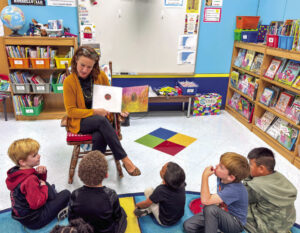Money Matters: Commit to growing family financial literacy
FRANKLIN LIVING JULY-AUGUST 2023
We have a lot of difficult conversations with our kids. Money can be one of the most trying! That’s mostly because it’s a constant lesson in teaching them money does not come easy. To kids, everything seems just a swipe of the debit card away.
One thing is for sure: It’s much easier to spend money when you’re not making it yourself yet. That’s why it’s good to start having financial discussions early on. The problem is, sometimes these conversations can seem awkward and stressful – for us and the kids both. With that being said, here are five tips to help you get started with these conversations. Keep in mind, these do not have to be sit-down, “formal” discussions. These can happen anywhere, anytime there’s an opportunity to chat with your kids.
- Encourage saving. Encouraging your child to save is one of the easiest and most important fiscal lessons. This doesn’t mean save their money and spend yours! Do teach them to save a little and spend a little; to look for values instead of buying the first thing they see; and to challenge themselves with savings goals.
- Set the example. Let your kids see you being fiscally responsible. This can be anything from discussing with them how you budget to having them help you keep a running tally on what’s going into the buggy at the grocery store. Letting them know money is most definitely not in an unlimited supply is important. My go-to line is, “Be a good steward of your money.”
- Define wants versus needs. This one is technically easy to grasp, but for some reason we all have trouble sticking to budgeting our wants verses ours needs. The key to teaching this one is having a continual conversation. Always be identifying and discussing the difference. Show examples and talk about them together.
- Identify opportunity costs. This one gets a little bit deep, but teaching our kids and ourselves that money is finite is key. Breaking this down: The money we use to buy one thing is no longer available for something else. Trade-offs are indeed a real part of life. Teaching our kids early on that we don’t get to have “all the things” will help them to be money smart as they grow up.
- Emphasize that patience is a virtue. Living in this fast-paced world, it’s difficult to make ourselves wait for anything; however, delayed gratification helps teach not only the real value of money but also self-discipline! We can teach our kids they can’t purchase everything they want all the time and teach ourselves to avoid impulse purchases. Not only is it a surefire way to save, but we actually end up valuing what we’ve bought more. Plus, we get to have a sense of accomplishment to top it off.
____________________________________________________________
Emily Mays is vice president/chief administrative officer at Community Spirit Bank in Red Bay, working in finance for 15 years. She is an enthusiastic social media marketer, financial literacy advocate and go-local supporter.







